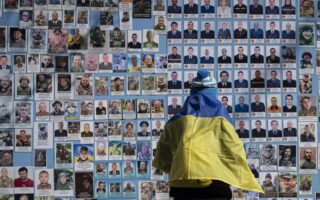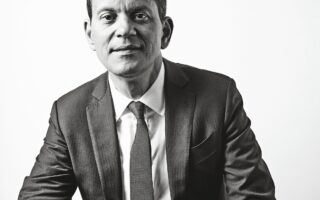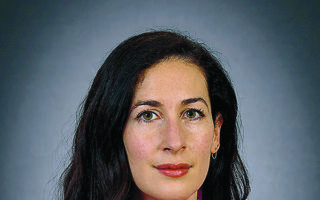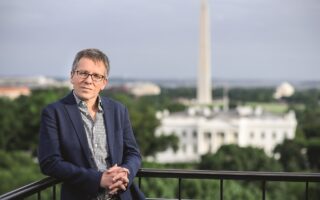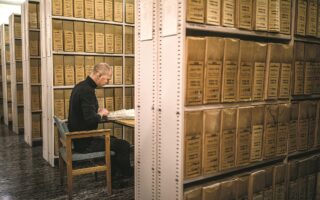‘We are both children of the same God’
Albanian PM speaks to Kathimerini about art, politics, bilateral ties and thorns like the maritime zones issue, which will be taken to The Hague
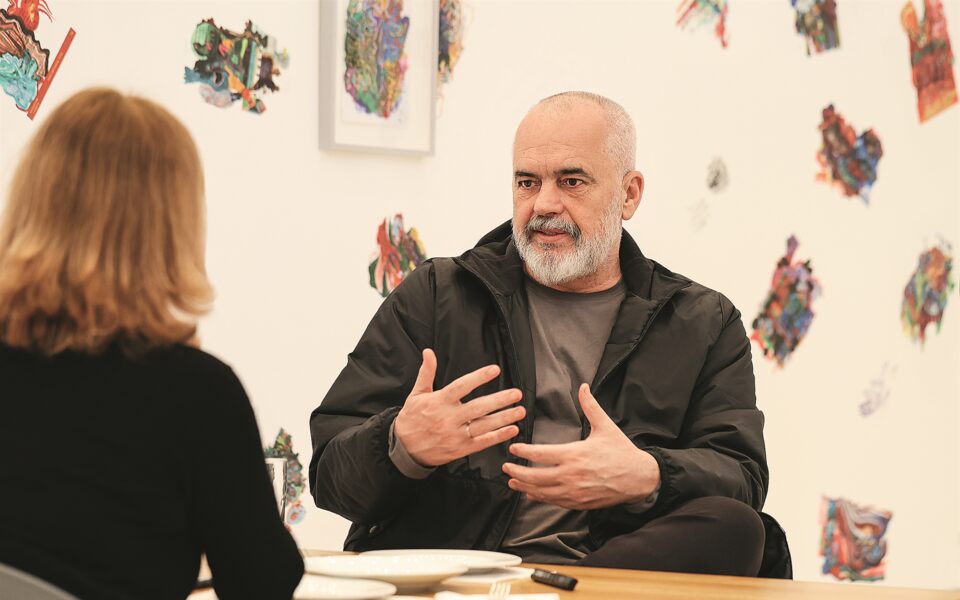
Standing at nearly 2 meters tall, with the physique of the former athlete that he is, wearing sneakers and a leather jacket, and speaking without mincing his words, Edi Rama is more like a rock star than a prime minister. His entire demeanor, in fact, says “unconventional.”
Kathimerini met with the Albanian leader on a Sunday earlier this month at Zappeion Hall in downtown Athens, where he and curator Katerina Koskina were setting up a massive installation of his artwork. Because apart from politics and basketball, Rama also studied and taught at the Academy of Fine Arts in Tirana, has shown his work in different parts of the world and also combined his sense of aesthetic with politics as mayor of the Albanian capital from 2000 to 2011.
The invitation to hold a show in Athens was extended by Greek Prime Minister Kyriakos Mitsotakis and Foreign Minister Nikos Dendias after they visited Rama at his office in Tirana in December and marveled at the art adorning its walls in the form of wallpaper and at the art supplies on his desk. The Zappeion show, which runs to March 31, comprises paintings on sheets of A4 paper and a series of ceramics he made at a friend’s workshop.
Is the Albanian prime minister at all torn between political cynicism and artistic idealism? “It is certainly a battle,” he says. “I never thought I’d become involved in public life. I thought I’d become an artist. But the universe laughs at our plans and it had a very good laugh with mine, sending me on a completely different path. Politics can be a cause of catastrophic decisions, developments and turns in history, but it can also be a means of significantly improving people’s lives, a massive transformational force. We would have nothing without politics; not democracy or freedom or equal rights. Ultimately, these are the reasons why people become involved with it.”
Our discussion inevitably turned to the deadly rail crash in central Greece on February 28. “Your tragedy is our tragedy,” the Albanian prime minister had said immediately after the incident, going on to declare March 5 as a national day of mourning in Albania, with flag flying half-mast. “Sympathy is a natural reaction and the people always feel closer to each other than their leaderships do,” he comments. “When a tragedy befalls us, we realize how similar we are and that we are both vulnerable to nature, children of the same God. And when that tragedy strikes a neighbor, you fell their pain even more intensely. So, average citizens have a lot to teach politicians about what they are and what they want – and the leadership should emulate them more.”
I follow up on that thought and ask him whether he feels that politics has caused him to give up on a certain part of himself. “I try to be me, but that is easier said than done sometimes. I don’t always wear the politician’s ‘suit,’ and I am also not the product of a party, but of an age of great change for my country. As an artist, I also felt society’s need for more freedom. I know what it feels like to be restricted and I don’t mean in terms of your livelihood or career, but something bigger than that. The fall of communism was like having to break down a symbolic wall for us Albanians. We experienced politics in action and we made it. But even then, I did not want to be a part of the political system,” says the 58-year-old.
‘The people always find a way to work things out. But there are politicians who are serving their own agendas’
Indeed, with the end of communism and Albania’s isolation, Rama moved to Paris to make a go of a career as an artist. “I went after my freedom. I traveled all the time, staying with friends here and there and selling paintings to get by. It was then proposed that I should be culture minister and later mayor of Tirana. Those were very different times; and again, it was the circumstances that determined those positions. At the time, the Albanian capital was completely chaotic and disorganized, and residents had a lot to contend with. As a mayor, but also as an artist, I knew that a mandate to repaint the facades of buildings in bold, bright colors would transform the capital, change its tune. And it did; it worked.”
For Rama, it’s always about circumstances. “Would I have become mayor if I was born in Sweden? No. Tirana is not Stockholm or Zurich. There isn’t much to change in Zurich. Mayors are a lot like artists: if you do a good job, the result is immediately visible, people see it. A prime minister is more like a maestro conducting a symphony. Being mayor is great,” he says.
He laughs when I ask what he would change in Athens. “I’m obviously not going to answer that question; that’s for your own authorities to say.”
Ties with Greece
Greece, says Rama, “feels like home in terms of the landscape, the people and its warmth,” but it also had the “good luck to become a member of the European Union, to have leaders like Karamalis, Papandreou and Mitsotakis who served that vision, and to have the Olympic Games.”
As far as Albania’s EU prospects are concerned, Rama says it’s a “tough process.”
“The accession process is a lot more complicated and demanding than it was for other countries in the past. Let’s just say that it’s a matter of political subjectivity, a difference in criteria. Everything is much stricter now and some countries would not have become members if they applied today,” says Rama, who recently suggested that Greece had “cheated” to become a member of the bloc.
There are also unresolved issues between the two neighbors, mainly the matter of maritime zones and the Greek minority in Albania. With regard to the former, Rama says that the two sides “have agreed to disagree and the matter will be settled by the International Court at The Hague. We have a fantastic relationship with Greece and personally with Kyriakos Mitsotakis, who knows how to speak and how to listen.”
In terms of the former, Rama says that “the people always find a way to work things out.”
“We have always been close. We were temporarily separated by communism and there was a wave of immigration from our country to yours after it fell that caused some concern, but over time this became mutually beneficial, for your country as much as for mine. The people, as I said earlier, always find a way to work things out. But there are politicians who are serving their own agendas and so bilateral ties are not defined by the human relationships but by the leaderships, and especially when we’re talking about countries that are neighbors.”
Regional developments
Our conversation turns to the impact of the Russian invasion of Ukraine on the regional chessboard of geostrategic relations and the possibility of new outbreaks of tension in the Balkans.
“People say that we produce more history in the Balkans than we’re able to consume. I am optimistic about the Balkans, though, especially if we find a way to work together and even more so to get under the EU umbrella. We have our issues, of course, our disagreements and our tricks, but that’s who we are – otherwise, we’d be the Benelux. Sometimes I even think we’re just playacting. My grandmother had a good saying: The happier your neighbor, the happier your home. Sure, we’ll fight and argue, but when disaster strikes, it’s your neighbor who will come to help first. Sympathy always comes first and the people know this.”
